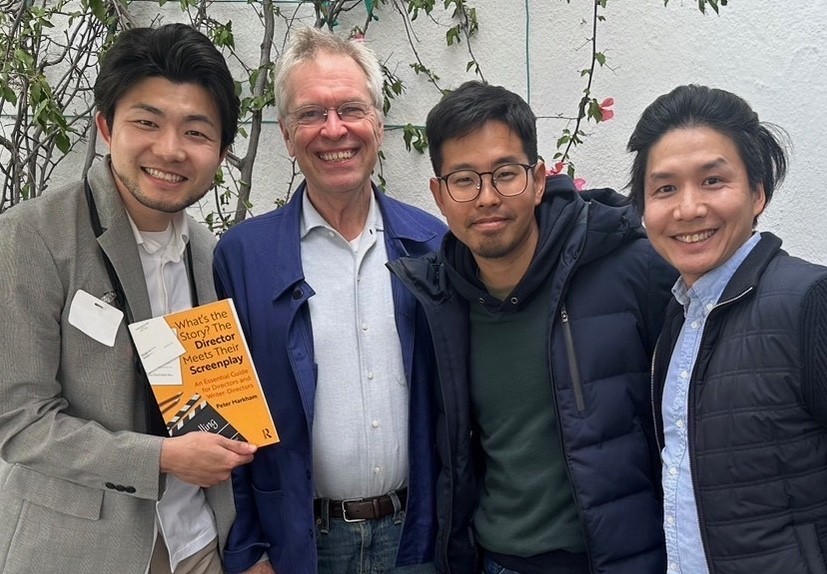
Today we’d like to introduce you to Peter Markham.
Hi Peter, thanks for joining us today. We’d love for you to start by introducing yourself.
I found myself eager to work in film & TV in my early teens but was told this was an impossible aspiration because I didn’t know the right people. I wasn’t from a privileged background and nobody in my family had worked in movies before, ever been a writer or teacher even. Then, I met silent movie star Bessie Love in her later days while I was still at grammar school in England. She told me that I should go ahead and do all I could to get into filmmaking. That was the blessing I needed! So, after reading Drama at University, I started as a Set PA at the BBC, continuing as a 1st AD and Production Manager, and working my way up to the BBC Directing Course, subsequently directing my film The Cormorant with Ralph Fiennes in the UK. Then I directed Second Unit for my friend Anthony Minghella on the Academy Award-winning The English Patient. I came to Los Angeles from London for several meetings and found myself staying for more and more meetings, directing second unit for Martin Scorsese on Gangs of New York and then, in the midst of writer and actor strikes, beginning to teach directing at AFI Conservatory. There, I learned to love teaching and to appreciate being with young filmmakers with all of their voices, talents, insights, and work. My time at AFI included eight years as Head of Directing. I mentored many talented filmmakers such as Ari Aster (Midsommar), Zoe Batmanglij (The OA), Sam Esmail (Mr Robot), and Akasha Stevenson (The First Omen). John Patton Ford (Emily the Criminal), and many others who I hope will forgive me for not mentioning them. After the school, I established myself as an educator in my own right, teaching in China and publishing two books: What’s the Story? The Director Meets Their Screenplay and The Art of the Filmmaker: The Practical Aesthetics of the Screen. I now offer my own online courses, amounting to over 50 hours of live sessions. I give individual consultations and provide a unique, personal approach to filmmaking education that has benefitted so many of my alumni in their careers.
Can you talk to us a bit about the challenges and lessons you’ve learned along the way? Looking back, would you say it’s been easy or smooth in retrospect?
Perhaps the most important thing to say here is that it takes a while to learn to be a teacher. It took me three years or so, although I’m still in touch with some of the alumni from my first classes and they continue to be appreciative. Teaching and mentoring young filmmakers from all around the world with a different sensibilities and different kinds of stories to tell, and the different ways in which they want to tell them, I found a very stimulating. The big lesson I learned was that it wasn’t about me telling young filmmakers what is right and what is wrong—because that’s all too general anyway— but that it was a case of exploring with them how to move forward, how to understand film and the language of the screen, how to understand story, different kinds of stories, and how to master storytelling. Coming to America has certainly presented challenges. Getting to know how the American sensibility works isn’t always easy for Europeans—and I consider myself a European rather than English alone. I think that aspects of the American psyche perhaps tend to dominate filmmaking education too much here, with an emphasis on the individual active protagonist and on conflict, often violent, often lethal, rather than new filmmakers being enabled to understand the facets of dramatic tension and the many ways in which image and frame engage and compel the viewer. So I try to give a much broader, more universally human perspective, putting an emphasis on story and storytelling on the screen.
Can you tell our readers more about what you do and what you think sets you apart from others?
I’m an Author, Educator, Consultant in Filmmaking and its Creative Aspects. I try not to conflate the industry or the processes of production with the nature of filmmaking itself, which I nevertheless deal with as practice rather than as theory. I’m not looking to be part of any club or offering such “membership” to anyone but I want filmmakers to think for themselves and explore beyond common established assumptions, so many of which can get in the way of deeper understanding.
What do you think about happiness?
My life with my wife, fashion designer Barbara Tfank, my family in England, my friends, my students and alumni, cinema, literature, philosophy, and music, those I meet or just see, those I never meet, never see, the shifting fall of light on the world and on things in it are what matter to me, what give me a sense of meaning. “Happiness” doesn’t come near to describing this.
Contact Info:
- Website: https://filmdirectingclass.com
- Instagram: https://www.instagram.com/filmdirectingclass/
- Facebook: https://www.facebook.com/filmdirectingclass/
- Linkedin: https://www.linkedin.com/in/peter-markham-461943168/
- Youtube: @filmdirectingclass6959
- Other: https://medium.com/@pmarkhamca






Image Credits
Lee Citron
Ari Aster











